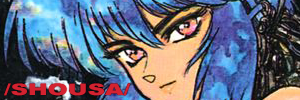If you’re talking about the manga, the mystical aspect is pretty explicit, it’s just buried under so much dialog that it’s hard to pinpoint on first reading, but, with a little knowledge of the sequel and of Orion, you can piece it out: during her near-death experience, Motoko meets 2501’s actual spirit, it’s (presumably) not a virtually-generated image, it’s an actual ESP thing, and since channelers are occasionally referred to in a serious context, it stands to reason that Motoko is some kind of channeler (at least in this instance).
It’s later explained that all that stuff works because there’s a psycho-electrical thingie called The Net which is basically God and connects everything since the beginning of time. Which of course causes a lot of confusion to a modern-day reader to whom «the net » just means « the internet ». But no, it’s actually God and by merging wth 2501 (who’s aware of it), Motoko essentially gained psychic powers, including the ability to manifest copies of herself, also with psychic powers, but with a messed-up memory. We know 2501 can copy herself because she's a program, but Motoko's copying process is presented as a mystical experience so it's almost certainly magical stuff.
And her goal, apparently, is now to help The Net grow, for no clear reason. It’s just suggested that stuff will « calcify » if she doesn’t make more psychic lifeforms.
Cosmic growth good, stagnation bad, yadda yadda, not really explained, just an opportunity for Shirow to point out functional similarities between all sorts of systems while jerking off his mythology boner, leading to some New Age stuff about being one with the cosmos and also a lesbian. Same type of thing that pops up in a lot of 90s scifi. The main bits of philosophy in this are «hey isn’t it funny how society and memories kind of behave like living things?» and « what if taoism was legit? »
Now Oshii on the other hand adds a bunch of other mythological components from other traditions (including the Bibble) and muddles it up by never presenting the supernatural stuff as 100% legit. As a result the focus is shifted away from cosmology, and placed onto existential topics, to create more of a psychological horror atmosphere, because we’re just never sure if all that mystical imagery is for real or if the characters are fucking up, and what exactly is at stake there, cause there’s no clear ontological foundation for the setting, and not enough characterization to be able to tell if something is amiss or goofed up after Motoko’s fusion, or to be able to tell how much it would matter. But there is a lot of questioning, so there’s no telling what should be taken at face value and what should be dismissed as an illusion.
As far as I can tell, the mystical stuff is probably not there for its own sake, otherwise it would be less ambiguous, it’s more about showing off the process through which an individual gains/loses faith. Like in a lot of Oshii movies.
If there’s a message there beyond « even in the future, people can still end up becoming religious », I haven’t found it. Because even though the mythological references are pretty strong, they don’t add up to a single clear thesis when taken into the broader context of the movie and Oshii’s works. There’s also stuff about love and maturity in there, and possibly about fiction in general, but again it’s so vague that you can come up with like nine contradictory interpretations of it.
Of course, it doesn’t help that the nitty-gritty of the script wasn’t written by Oshii himself, so I dunno how much of it comes down to an authorial intent to maintain doubt, and how much of it was just poor communication. And I haven’t read enough interviews to be able to sort it out. If you can quote him saying something definitive on this topic it'd be helpful
TL;DR: in the manga it’s explicitly magical shamanistic stuff, in the movie it’s left vague and communicated mostly through imagery and cultural references
also, nice tiddies on dat gremlin
